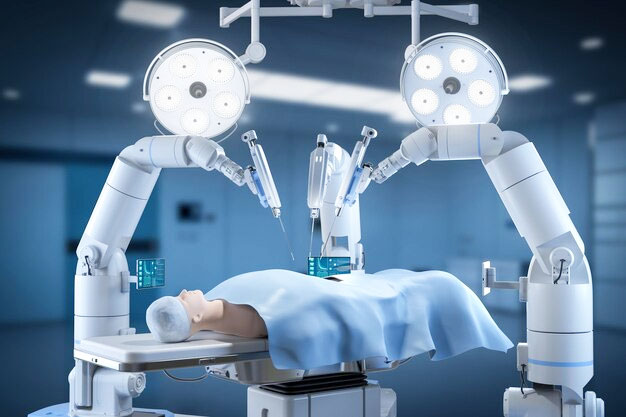Robotic Surgery for GI treatments: Hope or Hype?

In recent years, there have been significant medical technological advancements in the field of surgery, providing patients with innovative and minimally invasive options for gastrointestinal (GI) treatments. Robotic surgery has emerged as a revolutionary technique, offering enhanced precision and faster recovery times.
In this article, we will discuss in detail the hype and reality surrounding this cutting-edge technology for GI treatments.
Robotic Surgery: What is it?
Robotic surgery, also known as robot-assisted surgery, involves the use of robotic arms to carry out minimally invasive (keyhole) surgical procedures. With the use of robotic systems, surgeons can perform complex procedures with greater precision.
In the context of GI treatments, this technology has been applied to various procedures, including colorectal surgeries, gastric surgeries, and bariatric surgeries. The system typically consists of a console, robotic arms, and a camera-equipped endoscope, allowing surgeons to control the robotic instruments with exceptional precision.
The Robotic Surgery technology consists of:
- Surgical arms: Equipped with miniature instruments featuring wrists at their tips.
- Advanced camera: Offering magnified 3D views of the surgical site.
- Surgical console: Allowing the surgeon to precisely control the movements of the instruments and camera.
Robotic Surgery: Who performs it for GI treatments?
A GI surgeon who undergoes training in minimally invasive and robotic-assisted surgery conducts this procedure.
Robotic Surgery: For GI treatments
Robotic GI Surgery can be performed for the following conditions:
Colorectal
- Procedures for colorectal cancers
- Procedures for ulcerative colitis
- Procedures for rectal prolapse
Esophagogastric
- Cardiomyotomy for achalasia
- Sleeve gastrectomy, mini gastric bypass
- Esophagectomy
- Hiatal hernia repair and fundoplication
- Subtotal gastrectomy, distal gastrectomy, and total gastrectomy
Hernia
- Complicated inguinal and femoral hernias
- Complex abdominal wall hernias: incisional, ventral, and recurrent hernias
Hepato-Pancreato-Biliary (HPB)
- Liver resection
- Splenectomy
- Pancreatectomy
- Radical cholecystectomy
- Other complex HPB surgical procedures
Robotic Surgery: It’s advantages
If you require GI treatment, then consider discussing robotic surgery with your GI Surgeon for various medical treatments. Robotic surgery helps surgeons to conduct surgeries with greater precision and less invasiveness compared to traditional "open" surgery. This presents various advantages, such as:
- More precise and controlled surgery
- 3D visualization of the operative field
- Minimally invasive approach
- Less blood loss
- Minimized risk of errors
- Less risk of infection
- Resulting in less pain
- Minimal scarring
- Quicker recovery for patients
- A shorter hospital stay
- Better clinical results
Robotic Surgery: It’s Disadvantages
Robot-assisted surgery has few below drawbacks:
- Its successful implementation relies on the surgeon's skill and proficiency in using the robotic system.
- The absence of direct tactile feedback for the surgeon.
- Initially, it is an expensive procedure due to the use of sophisticated technology.
- There is limited availability of robotic systems in certain healthcare facilities.
- Robotic surgery takes more time as compared to laparoscopic surgery or open surgery.
- Patients are at risk of nerve injuries.
A note from Dr. Neeraj Goel
Patients considering robotic surgery for GI treatments should be aware of both the potential benefits and limitations. It is essential to engage in open communication with the surgical team to understand the specific advantages offered by robotic surgery for their particular condition. Collaborative effort between the GI surgeon and patient will play an essential role in providing the best outcome of robotic surgery during GI treatments.
Experience advanced GI treatments with Dr. Neeraj Goel, the best GI Robotic Surgeon in Delhi. With expertise in robotic surgery, he ensures precision and optimal outcomes for your gastrointestinal health.

 info@gastrodelhi.com
info@gastrodelhi.com +91-9599294453
+91-9599294453